One day, my dog Joy was constantly smacking his lips. At first, I found it funny, but soon it turned alarming. I took him to the vet immediately. I found out he was suffering from an infection. To avoid a situation like mine, go through this article on Dog Making Weird Mouth Movements.
In this article, we will cover:
- Dog Making Weird Mouth Movements
- 10 Reasons For Weird Mouth Movement In Dogs
- 4 Types Of Weird Mouth Movement In A Dog
- And more…
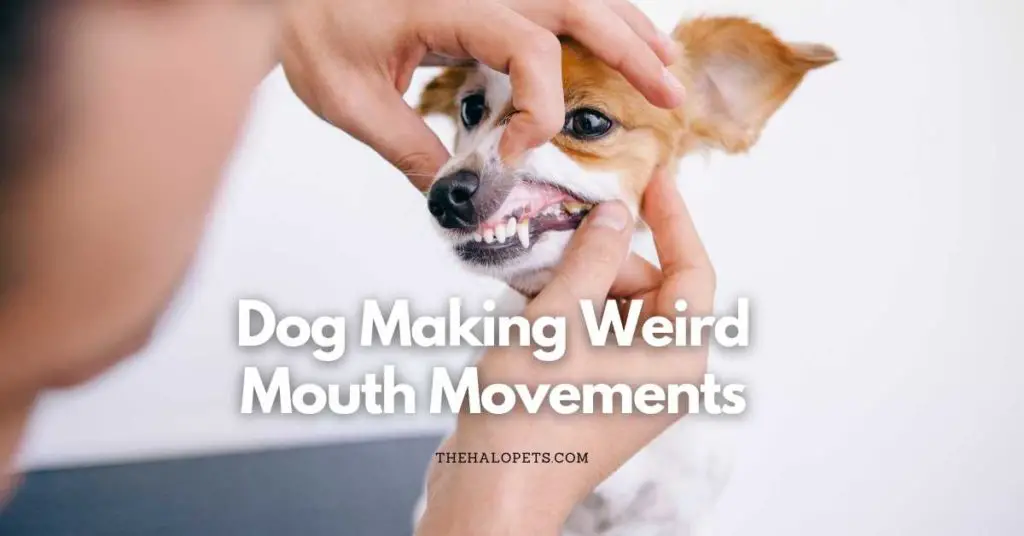
Dog Making Weird Mouth Movements
Dogs smack their lips, chatter their teeth, make chomping sounds, and open and close their mouths repeatedly, also called jaw spasms when they have poor oral health, neurological issues, behavioral issues, anxiety and stress, pain, ear infection, mouth disorders, bruxism, or gastrointestinal issues.
It is amusing that dogs can talk to us through actions. Often dogs keep repeating weird mouth movements to grab their owner’s attention. Once they have it, they continue it till the time you respond to it.
Although it seems hilarious at times, this could also be a clear indication of something more serious. Therefore, avoiding such signs is not okay. As a pet parent, you should take the responsibility into your hands and see if your dog is suffering. If so, take your dog to the veterinarian as soon as possible.
10 Reasons For Weird Mouth Movement In Dogs
Here is a list of 10 most common reasons for weird mouth movements in your dog:
1. Poor Oral Health
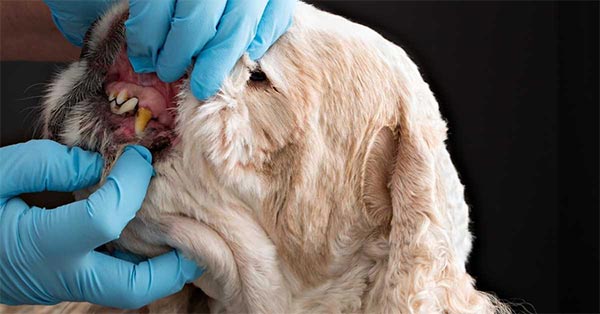
According to Lorraine Hiscox, DVM, and Jan Bellows, DVM at the VCA Hospitals, over 80% of dogs above three years of age have dental diseases. Periodontal diseases are the most common among them.
It occurs when bacterial plaque forms around a dog’s teeth. In severe cases, it can spread to gums causing gingivitis. Because of all this, dogs do weird mouth movements to relieve the pain or discomfort.
These movements can further aggravate the problem and wear down a dog’s teeth. The PetMD Editorial mentions that dental problems lead to inflamed hearts. In many dogs, periodontal diseases are accompanied by heart disease as cultured bacteria found in the valves of the heart are the same as found in the mouth of dogs
2. Neurological Issues
The neurological disorder epilepsy is very common in dogs. Dr. Ernest Ward, DVM explains epilepsy as a condition characterized by continuous seizures in dogs.
So, if your dog was diagnosed with epilepsy, we can understand it must be going through a lot. Weird mouth movements are a response to his state and pain he feels at times.
3. Behavioral Reasons
Just like humans, dogs too experience a wide range of emotions from anger, sadness, happiness, to excitement. In such situations, they chatter their teeth and smack lips to show that emotion.
If your dog is doing it because of these reasons, you do not have anything to worry about.
4. Anxiety And Stress
Stress and anxiety are possible in dogs as well in situations that are out of their control. These situations include bad weather, crackers, the presence of unfamiliar people or dogs, distress at your home, and the absence of their owners.
Thus, they try to calm themselves by making noises, clicking their teeth, or smacking their mouth.
5. Pain
Since dogs cannot communicate with humans directly, they chatter their teeth to indicate they are in pain. It is a reflex movement in response to pain, however, this can aggravate the pain further.
Dogs with dental problems, infections, neoplastic problems, gastrointestinal issues, or fractures generally do this. In addition to it, you will see dogs chattering their teeth when they lose baby teeth
6. Ear Infection
Another common condition in dogs after periodontal diseases is otitis. It is the inflammation of the middle ear, causing infection in the ear. In some cases, it becomes a permanent issue and all you can do is reduce symptoms then.
Ear infections are extremely painful for dogs. The pain can become unbearable at times. This frustrates them further, causing weird mouth movements.
7. Cold Temperatures
In the worst cases, cold temperatures can cause hypothermia in dogs. The main symptom of hypothermia is tremors in the body. However, it develops gradually. So, initially your dog would shiver and chatter their teeth as it is uncomfortable.
Subsequently, their breathing rate drops down, their skin turns pale, heart beat and pulse fall below normal levels, pupils dilate, and they collapse.
To avoid this extreme situation from occurring, make sure to keep your dog covered in winters and cold days.
8. Choking
Food and foreign objects often get stuck in a dog’s throat when they do not chew it properly. This hampers their normal breathing process.
According to the PetMD Editorial, you can help your dog by opening its mouth with one hand on the upper jaw and the other hand on the lower jaw.Look inside your dog’s mouth and eliminate the blockage.
However, if they are deep down in the throat, do not try to take them out on your own, rather take your dog to the vet immediately
9. Mouth Disorders
Inflammation of the tongue, gum diseases, lip wounds, and lip fold dermatitis are mouth disorders in dogs. They can cause extreme agony and ache to dogs. Thus, dogs chatter their teeth, smack their mouth, or open and close it repeatedly.
10. Gastrointestinal Issues
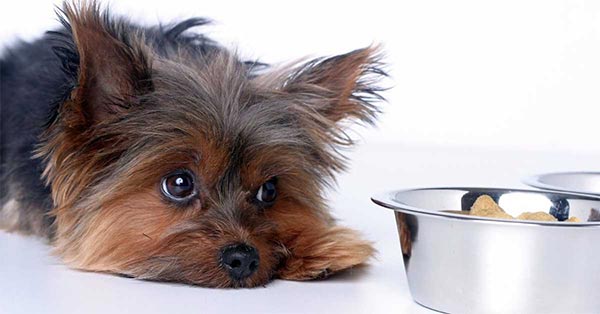
A dog with GI disease shows symptoms such as nausea, vomiting, diarrhea, lethargy, and loss of appetite. Thus, they may rub their teeth together, making a grinding sound. In addition, you might see slight drooling as well.
4 Types of Weird Mouth Movement In A Dog
1. Teeth Chattering
If you ever hear your dog clicking his teeth, the first reaction is that it is feeling cold. So, you instantly wrap it around in a blanket. But this is not all. There could be other reasons as well.
Dogs often chatter their teeth when they are happy and excited about something. It happens when dogs see their pet parents after a long separation or after a fun play session.
However, there are some negative reasons for dogs’ chattering teeth too. These include periodontal diseases, cold temperatures, a stressed environment, and in the worst-case scenario, an underlying health condition.
According to Dr Heidi Kos-Barber, DVM at PetMD, a pet parent should be concerned if the chattering of a dog’s jaws or teeth is connected with loss of appetite, swelling near the mouth, bleeding, weight loss, and bad breath. In this case, make an appointment with the vet and get the diagnosis done.
2. Smacking Of Lips
Since dogs communicate in multiple ways, smacking lips is one of them. When lunch and dinner are ready, you will notice your dog smacking his mouth in anticipation of food. Is it always a similar case? No.
Dogs often smack their lips when they are thrown into a stressed environment as it makes them very nervous. This could change in weather, entry of a new dog or person, or your regular veterinarian visits.
Smacking their mouth helps them relax in these situations and indicates to the other person or dog that they are not a threat to them.
But, if your dog isn’t in any such situations and still smacks his lips, you need to be attentive. It could be a sign of dehydration, kidney disease, consumption of toxic foods, liver disease, epilepsy, or seizures in dogs.
Also Read: 30 Worst Foods Dog Should Never Eat
3. Opening and Closing Mouth Repeatedly
Dogs tend to open and close their mouths repeatedly when under tedious circumstances. So, there could be several reasons for it, some non-serious and others life-threatening. So why do dogs open and close their mouths rapidly?
After eating food, some food gets stuck in a dog’s mouth. This food piece isn’t large enough to choke a dog but it can very easily irritate them. Opening and closing mouths is an attempt by them to throw that piece out.
There are some items that a dog should not eat like plastic and wood. Although you cannot prevent them from happening all the time, dogs are smart creatures who understand this quickly. Hence, they open and close their mouths rapidly to throw that unwanted substance out.
You can help your dog by brushing its teeth. Else, you can wrap a cloth around your finger and clean their teeth with your hands. However, if this happens at times other than meals, consult your vet as it could be a medical issue.
4. Chomping Sound
Sometimes a dog’s chomping sound is so faint that you can hardly hear it, while at times they are so loud that you won’t be able to sleep at all. The main question here is why does your dog make chomping or chewing sounds unnecessarily?
Dogs often feel anxious and stressed especially when they are away from their owners. In these difficult situations, they soothe themselves by making chewing noises.
If your dog feels nauseated, chomping sounds are very common. The mouth produces excess saliva to prevent the internal organs from stomach acid coming up to the throat. Thus, the dog has to gulp the additional saliva, resulting in noises.
Finally, dogs can intentionally make chomping sounds as well if they think they will be rewarded with a treat. Since this is a wrong behavioral trait, you should train and teach your dog to obey you!
Also Read:Top 10 Tips and Techniques for Training Your Dog + 5 Commands Training
Why Does My Dog Look Like He Is Chewing Gum?
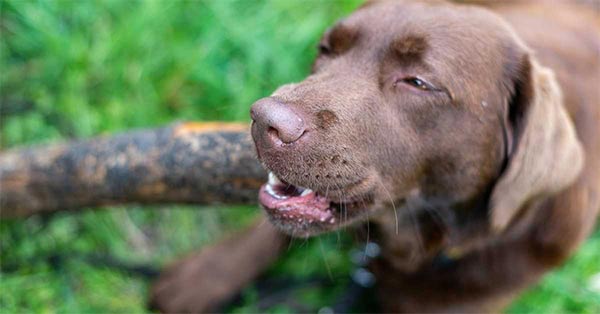
It is a usual sight for pet owners to see their dogs chew although there is nothing inside their mouths. They often open and close their mouth, making it look like they are chewing gum. If it happens once or twice, you need not be cautious.
But in case your dog has been doing this repeatedly, it is time for you to probe into the matter. There could be multiple reasons for it.
Here is a list of reasons why your dog might be feeling discomfort:
- Food is stuck in its mouth
- Something is stuck in their throat
- They are feeling nauseated
- They are anxious and stressed
- They have muscle spasms
- Their dental health isn’t good
Why Is My Dog Making Weird Mouth Noises?
Dogs make a variety of noises ranging from adorable to concerning. Hence, there are some sounds that you should be worried about. Here are a few examples with reasons for you to understand this better.
- Barking is casual in dogs. But, if this barking is accompanied by raised hackles, your dog might have behavioral issues or it is anxious.
- Honking at night is experienced by dogs when they are excited. But, if your dog is honking differently than usual, it is a sign of tracheal collapse.
- Gagging or hacking sound continuously is a pointer that something is stuck in their throat. You must check it immediately as it could choke your dog.
- Finally, dogs whine and whimper when they are in extreme discomfort or pain. At times, puppies also cry as they are scared of the new environment.
Do Puppies Make Weird Mouth Movements?
Puppies make weird mouth movements too. You may have often seen puppies chattering their teeth and smacking their lips when the baby teeth fall and permanent teeth start to grow.
Additionally, when puppies get sick, they often repeatedly open and close their mouths in pain.
So, just like adult dogs, puppies also experience these mouth movements for various reasons mentioned above.
How To Prevent My Dog From Making Weird Mouth Movements?
Preventing your dog from making weird mouth movements requires timely intervention. You must detect the problem in your dog and then take the necessary steps accordingly. So, here are two steps you can take to prevent weird mouth movements in dogs:
1. Veterinarian Visits
Not only taking your pet to the vet when it is sick is vital, but also making sure your dog goes for regular health checkups is crucial. This will help in management of symptoms at an early stage, preventing your dog from pain later.
Vets generally suggest yearly physical examination for adult dogs and twice a year for old dogs. Get all the vaccinations done timely. Conduct the follow-up blood and urine tests as advised by your veterinarian for your pup’s good health.
2. Dental Hygiene
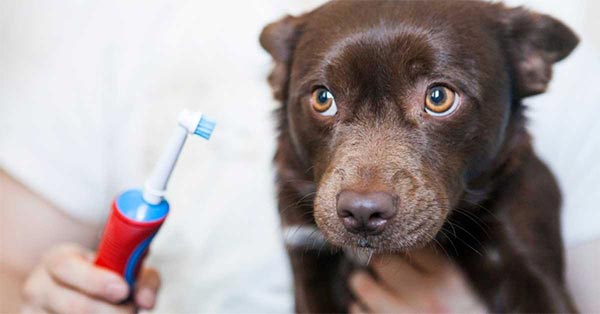
Dogs have soft teeth that make them prone to tooth and gum problems like tooth decay and loss of teeth.
So, brushing your dog’s teeth thrice a week is recommended. Once your dog gets used to it, you can brush its teeth twice a day just like we do. It helps reduce tartar and prevents plaque in dogs. Besides this, you can occasionally use dental chews to clean your puppy’s teeth.
For this, you will need a good-quality toothbrush. The and the No products found. are best for your dogs!

